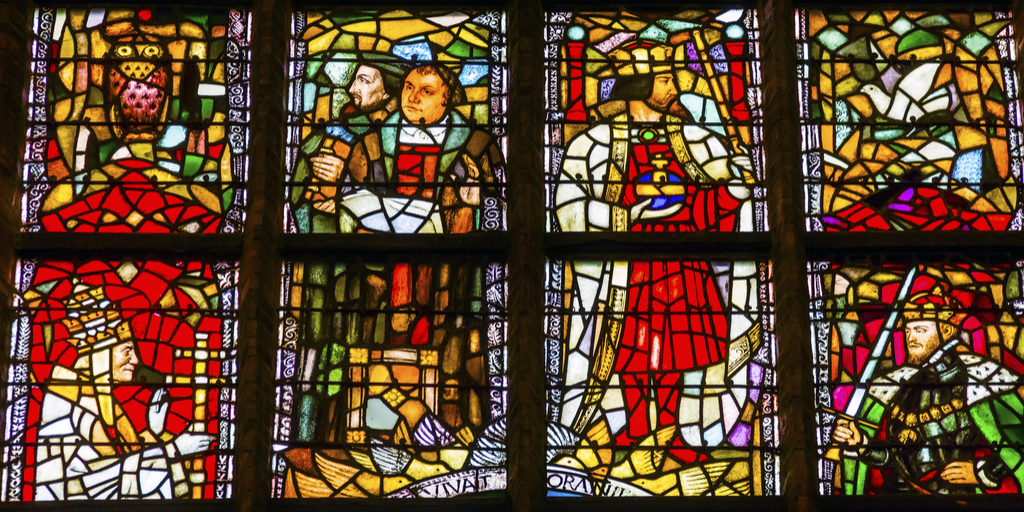Luther and Liberalism
Numerous historical accounts present Martin Luther as the starting point for the rise of Western liberalism. In the most recent issue of the Concordia Theological Quarterly, historian Korey D. Maas writes:
Whatever our ultimate assessment of liberalism, however, the fact remains that from the eighteenth century into the twenty-first, some of the most dominant narratives of both its proponents and its opponents tend to begin with Luther.
While serving as a convenient dividing point—and however significant in other ways—I am unsure that Luther truly rates either as a positive or negative factor in the rise of liberalism.
Part of the problem, as Maas suggests, is too often assessment of the role of Luther in the rise of liberalism tends to be little more than a backward projection of the writer’s attitude toward Luther and the writer’s attitude toward liberalism. Maas’s simple model accounts for a huge amount of variation across opinions. Almost everyone’s views fall into one of four possibilities:
- Luther was a proto-liberal and that’s a good thing.
- Luther was a proto-liberal and that’s a bad thing.
- Luther was not a proto-liberal and that’s a bad thing.
- Luther was not a proto-liberal and that’s a good thing.
While the first three have their various proponents, Maas is not aware of anyone publicly articulating the last view; there is, as yet, Maas writes, no Deneen-like debate among conservative Lutherans. (Why that might be is grist for another mill.)
Although Luther provides a convenient dividing point in telling the story of liberalism in Western history, the temptation exists to mistake a convenient focal point for causation—the old post hoc (ergo propter hoc) fallacy.
If anything, Luther was a catalyst rather than a cause. Both fans and detractors treat Luther as introducing something truly de novo. Truth is, Luther was very much a man of his times. His theology was, if anything, a reaction to long existing and deepening individualistic (and, hence, liberalizing) currents in the religion and society of his day. It was because of the individualistic turn in Medieval piety prior to Luther that his theology struck the nerve that it did while earlier proto-protestant movements did not. Even the groundwork for the unintended political consequences had been set prior to Luther in the Schism and “papal revolution” (Harold Berman’s phrase in Law and Revolution for Pope Gregory VII’s reforms) of the 12th century.
My point is not to deny that Luther is an important figure in the history of the West. The question is whether he is—for better or for worse—the causal figure of so much liberal historiography. Luther may be better understood as a man more reflecting his time than creating it. Or, perhaps, a figure who served as a catalyst rather than as a causal agent.
Several significant, already long-existing currents made Luther possible. These currents were both religious and social.
First and foremost there was a signal change in Christian piety and self-understanding in the centuries prior to Luther. Modern Christians and modern non-Christians largely miss the signal aspect of this change. We miss it because we think as modern Christians that this was always true of Christianity.
A signal turn in the history of Western Christianity occurred when the central question of the tradition became, “Will I go to heaven or hell when I die?”
If as a reader you just asked yourself, “What else would Christianity be about?” That question shows the depth of this change, the displacement of Christian (and Hebraic) categories with Platonic categories. Moderns—whether believers or nonbelievers—can scarcely imagine what Christianity is supposed to be about if it’s not about that.
Fully tracing the older answer would take us too far afield. In brief: It’s not as though heaven and hell are unknown before this radically individualizing pivot in Christian piety. Obviously. But the accent of the older view was on the start of a new creation in the midst of the old, with God breaking into a fallen world in and through his Son. In more abstract theological terms, the story of Jesus is the story of an inaugurated, but not overrealized eschatology. The focus was on the start of a new humanity in the here and the now. To be sure, a new humanity that extends into the Age to Come, and would be fully realized only then. But the focus was on union with Christ, both in the vertical sense—with the Second Person of the Godhead—but also in the horizonal sense, of union with one another in the “communion of the saints.”
As N.T. Wright explained in his Erasmus lecture a few weeks ago,
A biblical view of Easter has to struggle not just against skepticism—which was just as strong in the ancient world as in the modern—but against Christian misunderstandings going back in western theology to the Middle Ages, when “heaven and hell” became the big categories and the very idea of “new heaven and new earth” was forgotten, despite its prominence in the New Testament itself.
Similarly, this turn in Christian piety forms a central part of Charles Taylor’s argument for why Western society secularized in his book A Secular Age.
There was, Taylor writes, a turn in attention in Medieval piety from the transformation of the cosmos (Wright’s “new heaven and new earth”) to divine judgment after one’s death—with the focus on “one’s” death. This “anxious turning toward death,” Taylor writes, brought with it “a certain individuation . . . . The whole dimension of response to the call, judgment, transformation is one which appeals to individual responsibility.”
This shift occurs for a number of different reasons, according to Taylor. Dating from at least the Lateran council of 1215, “the whole effort of Latin Christendom [aimed] toward raising the level of religious devotion and practice of the whole society.” The tool to do so? Scaring people with the threat of hell after they die in order to increase the rigor of their piety during their lives. This was a tactic employed by both Church hierarchy and on the ground level with the preaching of mendicant friars and others, according to Taylor.
The shift wasn’t only religious, however. Concurrent with this was an increase in commercial life in Europe in which people left traditional social structures and lives in villages and joined the more socially-mobile life in the towns. Further, among this class of laity, as well as among parish-level clergy, “people were seeking a more personal religious life, wanted a new kind of prayer, wanted to read and mediate the Bible themselves.”
In the midst of these religious and social currents, Luther’s extreme angst about his own personal salvation is not idiosyncratic at all. Rather, as Taylor argues:
In propounding salvation by faith, Luther was touching on the [centrally distressing] issue of his day, the central concern and fear, which dominated so much lay piety, and drove the whole indulgences racket, the issue of judgment, damnation, salvation.
In this reading, Luther’s angst about personal salvation does not represent anything particularly new. It is only another moment in the working out of social and religious trends that started centuries before he nailed his theses to the door of the church at Wittenberg. Of course, Luther gave an individualizing answer in the Leipzig debate, that the Bible did not teach about the sale of indulgences to reduce time in purgatory. He could have done no other. But the existing answers were already individualistic answers, they just weren’t answers that satisfactorily responded to the individualistic angst of a broad swath of the Christian population by that time.
As I mentioned above, even the presumably unintended consequences of Luther’s actions might have continued, even catalyzed, fractionalizing outcomes but did not cause them. The East/West schism of 1054 and Pope Gregory VII’s “papal revolution” of the 11th Century created the paradigm for subsequent Western revolutions. The very form of the Church after this time provided the example for the modern nation-state ultimately reflected in the settlement of Westphalia.
We can still praise, or condemn, Luther for what he taught. The question, however, is Luther’s role in the development of liberalism. Whether Luther was a protoliberal or not—or whether he is somewhere in the muddled middle—the answer in fact makes little difference in the trajectory of Western liberalism. The roots of Western liberalism both precede, and go far deeper, than Martin Luther and his influence.


